Behind the tests offered in our catalog, there is a team of veterinary diagnostic professionals who are working every day to process the samples clients send to us. These professionals are committed to ensuring clients receive accurate and timely results for the tests requested. Read on to learn more about the work of the expert team in our Nutrition and Toxicology Section.
Meet John Buchweitz, PhD, MS, DABT, MSU VDL Nutrition and Toxicology Section Chief
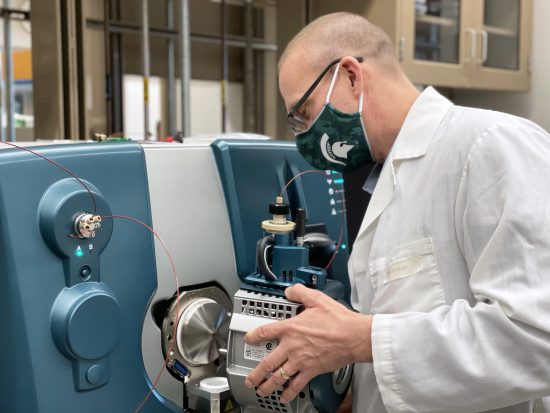
Q: What does your section do?
A: My section handles the analytical evaluation of samples for Nutrition and Toxicology. Within Nutrition, we are concerned with monitoring nutrient mineral and vitamin status. In Toxicology, we evaluate the presence, or absence, of heavy metals and a whole suite of drug, pesticide and other sundry industrial chemicals recognized, or suspected, for causing animal illness or death.
Q: Is there a piece of equipment/instrument in your section that you would like to highlight?
A: During this last year we were fortunate to obtain a grant from the U.S. Food and Drug Administration’s Veterinary Laboratory Investigation and Response Network to purchase a new liquid chromatography tandem quadrupole mass spectrometer, also known as an LC-MS/MS. This instrument has great capabilities for looking at many drug and pesticide residues to the low parts per billion and high parts per trillion range. This is the kind of sensitivity that veterinarians, consumers, and regulatory officials expect when there are concerns for evaluating endocrine function, monitoring therapeutic drugs, and identifying trace contaminants in animal tissues or products.
Q: Are there any types of cases or tests that you find the most rewarding or interesting?
A: I really enjoy regulatory and forensic cases. I like the challenge of being able to help regulatory officials find timely answers. I also find solving elaborate forensic cases to be a rewarding aspect of my job.
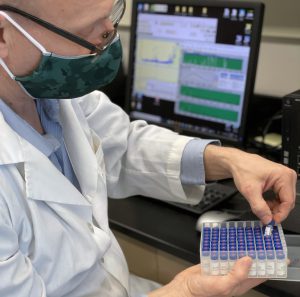
Q: What kind of cases keep you up at night?
A: Animal abuse cases are the most troubling for me. I see everything from intentional poisonings with various chemical agents to outright physical abuse and starvation. I seriously struggle with the idea that people could treat animals with such neglect and disregard for life. For these cases, I have the opportunity to give those animals one last voice – a diagnostic interpretation of what may have led to their death.
Q: How does your animal health work impact human health?
A: One aspect of our diagnostic testing service has to do with food safety. We actively collaborate with our state and federal partners during investigations of tainted feed or food-animal products. We strive for quick and accurate responses to ensure that consumers are protected, and the food supply remains wholesome for both animals and people.
Faculty Directory Profile: BuchweitzPerspectives from the Bench
Adam Bush, Laboratory Technologist/Leader
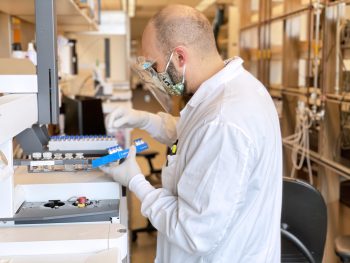
Q: What aspects of your job do you enjoy the most?
A: I enjoy the testing and instrumentation diversity we have in Toxicology. Each day you could be running a different analysis on a different instrument, which keeps it exciting and increases your instrumental knowledge.
Q: What part of your job is the most rewarding?
A: The most rewarding part is finding the answers to the why and how. Toxicology is about answering the questions of veterinarians, law enforcement, or even private citizens. Why is this animal sick? How did this animal die?
Q: Do you have a favorite test to perform or instrument to use?
A: The GC/MS and the general organic compound screen we run on it is a great test that can gather the most information at once. You can use it to really focus on one compound, or to cover a wide range of compounds if you don’t know what you’re looking for.
Alaina Covert, Laboratory Technologist
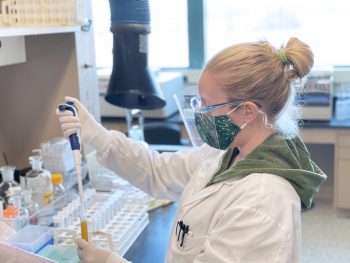
Q: What part of your job is the most challenging?
A: The job itself is very broad, and that comes with its own challenges. One day you could be working on extractions, and the next you could be doing instrumentation, You never really know what is going to walk into the lab, so you have to pivot and help out whenever and wherever the lab needs help.
Q: What part of your job is the most rewarding?
A: Kind of the same as above, the fact that the job itself is so varied and you are challenged in so many different ways is very rewarding. I love being able to help different parts of the lab and learn from all those aspects of the lab.
Q: Do you have a favorite test to perform or instrument to use?
A: I really enjoy the unknown aspect of working in the organic side of Toxicology. We have the GC/MS, anticoagulants, nitrates, convulsants, along with many others. These tests work on extracting unknowns from samples, so it is very rewarding to see what kinds of compounds are present in these samples.
Sarah Rebolloso, Laboratory Technologist/Leader
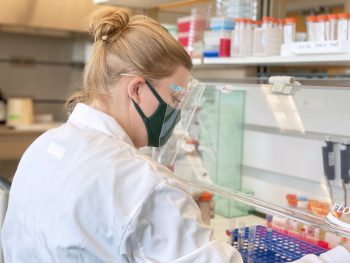
Q: What is your academic background/training? Why did you pursue a career at the VDL?
A: I have a BS in environmental studies and applications. I began my career doing inorganic analysis at an environmental laboratory in the mid-Michigan area. After several years working exclusively with ICP-MS instrumentation there, I moved here. At the MSU VDL I am able to continue my work with the ICP-MS as well as several other areas of analyses. I have been able to gain experience with the GCMS, GCMS-MS, HPLC, UPLC, and GCFID. I love the diversity of the work here at VDL. Depending on the cases that come across the bench, every day can look different.
Q: What aspects of your job do you enjoy the most?
A: I like the ability in Nutrition to analyze so many samples in such a short amount of time. The ICP-MS turns over samples in a matter of minutes. It is not unusual to result hundreds of samples in a single day.
In Toxicology, I like the investigative nature of the analyses. We often get cases where the veterinarian will have no idea what the animal has gotten into. We can help them solve that mystery by performing a variety of tests. It is very rewarding when we can give an owner closure to the cause of their pet’s death.
